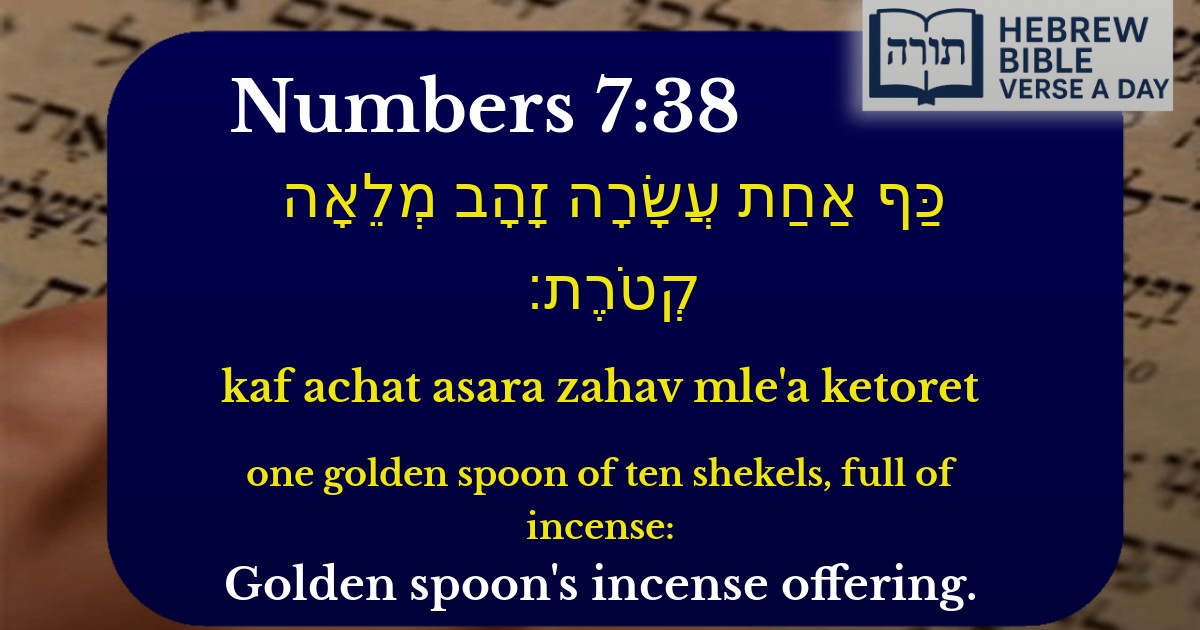Frequently Asked Questions
Q: What does the 'golden spoon of incense' represent in Numbers 7:38?
A: The golden spoon (כַּף זָהָב) filled with incense (קְטֹרֶת) was part of the offerings brought by the tribal leaders during the dedication of the Mishkan (Tabernacle). Rashi explains that this symbolizes the importance of sincere prayer and devotion, as incense represents the prayers of Israel ascending to Heaven (based on Psalms 141:2).
Q: Why was the spoon made of gold in this verse?
A: Gold represents purity and holiness in Jewish tradition. The Rambam (Hilchot Klei HaMikdash 1:2) teaches that vessels used in divine service must be made from the finest materials to honor Hashem. The golden spoon, specifically, reflects the preciousness of the incense offering and the reverence due to the Mishkan's service.
Q: What is the significance of the incense (ketoret) in this verse?
A: The ketoret (incense) had a special role in the Mishkan and later the Temple. The Talmud (Keritot 6b) states that the incense atoned for lashon hara (evil speech) and fostered unity. Its sweet fragrance also symbolizes the desire for a close relationship between Hashem and the Jewish people.
Q: Why does the verse specify that the spoon held 'ten shekels' of incense?
A: The weight of ten shekels signifies completeness in Jewish thought, as ten is a number associated with holiness (e.g., the Ten Commandments, minyan of ten for prayer). The Midrash (Bamidbar Rabbah 13:14) connects it to the ten utterances of Creation, showing that proper service to Hashem aligns with the foundation of the world.
Q: How does this verse apply to us today without the Temple?
A: While we no longer bring physical incense offerings, the Talmud (Berachot 26b) teaches that prayer replaces the Temple service. The golden spoon reminds us to approach prayer with the same care, sincerity, and beauty as the ketoret—making our words 'rise like incense' (Psalms 141:2) in devotion to Hashem.


Explanation of the Verse
The verse "כַּף אַחַת עֲשָׂרָה זָהָב מְלֵאָה קְטֹרֶת" (one golden spoon of ten shekels, full of incense) appears in the context of the offerings brought by the tribal leaders (נשיאי ישראל) during the dedication of the Mishkan (Tabernacle) as described in Bamidbar (Numbers) 7:14. This verse refers to the offering of Nachshon ben Aminadav, the prince of the tribe of Yehudah.
Symbolism of the Golden Spoon (כַּף זָהָב)
Rashi (Bamidbar 7:14) explains that the כַּף (spoon) was a vessel used for holding the קטרת (incense). The spoon was made of pure gold, symbolizing both the value of the offering and the sanctity of the service in the Mishkan. The Rambam (Hilchot Klei HaMikdash 2:4) further elaborates that all vessels used in the Temple service, including the spoon, were crafted with precision and holiness.
Significance of the Ten Shekels
The weight of the spoon—עֲשָׂרָה זָהָב (ten shekels of gold)—carries deeper meaning. The Midrash (Bamidbar Rabbah 13:14) connects this to the Ten Commandments, suggesting that the incense offering reflects the acceptance of Torah and divine service. Additionally, the number ten represents completeness, as seen in the Ten Utterances of Creation and the Ten Tests of Avraham.
The Incense (קְטֹרֶת)
The קְטֹרֶת (incense) was a unique blend of spices used exclusively in the Mishkan and later in the Beit HaMikdash. The Talmud (Keritot 6a) details its eleven ingredients, emphasizing its sacred nature. The incense symbolizes prayer and divine connection, as stated in Tehillim (Psalms) 141:2: "Let my prayer be set forth as incense before You."
Spiritual Lessons